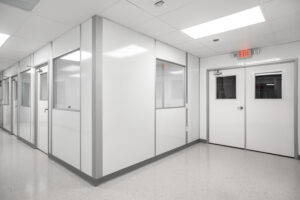12 Feb Modular Cleanrooms: The Future of Controlled Environments
Allied Modular Cleanrooms: The Future of Controlled Environments
Introduction to Modular Cleanrooms
In the world of scientific research, manufacturing, and high-tech industries, the need for environments with controlled levels of contaminants is paramount. Enter modular cleanrooms, a revolutionary solution designed to meet these stringent requirements. Unlike traditional construction, modular cleanrooms offer a flexible, efficient, and cost-effective way to create pristine environments tailored to specific industry needs.
Understanding Cleanrooms
A cleanroom is a controlled environment where pollutants like dust, airborne microbes, and aerosol particles are filtered out to provide the cleanest area possible. These rooms are crucial in industries where small particles can adversely affect the manufacturing process, compromise product quality, or jeopardize research outcomes.
The Modular Advantage
Modular cleanrooms leverage the principles of modular construction, where components are prefabricated in a factory and then assembled on-site. This approach offers several advantages over traditional cleanroom construction:
- Speed of Assembly: Modular units can be quickly installed, significantly reducing project timelines.
- Flexibility: These cleanrooms can be easily expanded, reconfigured, or relocated to adapt to changing business needs.
- Cost-Effectiveness: With most of the construction happening off-site, modular cleanrooms often come with lower labor costs and minimized on-site disruptions.
- High Quality: Prefabrication in controlled environments ensures consistent quality and adherence to cleanroom standards.
Applications of Modular Cleanrooms
Modular cleanrooms are versatile and can be found in various sectors, including:
- Pharmaceuticals: For drug compounding, research, and manufacturing where sterility is crucial.
- Biotechnology: In research and development labs where contamination can invalidate results.
- Electronics: Especially in semiconductor and microelectronics manufacturing where dust particles can damage the manufacturing of circuit boards and chips.
- Aerospace: For the assembly of sensitive components that require contaminant-free environments.
Key Features of Modular Cleanrooms
Customization
Modular cleanrooms are designed to meet specific requirements, including ISO classifications for cleanliness levels. They can be tailored to accommodate the size, layout, and features needed for particular applications.
Advanced Filtration Systems
HEPA (High-Efficiency Particulate Air) and ULPA (Ultra Low Particulate Air) filters are commonly used in these cleanrooms to remove a high percentage of particles from the air, ensuring the cleanliness level required for sensitive operations.
Controlled Environment
Apart from controlling particulates, these cleanrooms can also regulate temperature, humidity, and pressure to create an ideal environment for various processes.
Choosing the Right Modular Cleanroom Provider
When selecting a provider for your modular cleanroom, consider factors like:
- Experience and Expertise: Look for a company with a strong track record in your industry.
- Customization Capabilities: Ensure they can tailor the cleanroom to your specific needs.
- Quality and Compliance: Check that their products meet industry standards and regulations.
- Support and Service: Opt for a provider that offers excellent customer service and after-sales support.
Conclusion: A Clean Solution for Complex Needs
Modular cleanrooms represent a significant advancement in creating controlled environments for critical industries. With their flexibility, efficiency, and high-quality construction, they offer an ideal solution for businesses looking to maintain stringent cleanliness standards. Whether for pharmaceutical production, scientific research, or electronics manufacturing, modular cleanrooms are paving the way towards more innovative and adaptable controlled environments.

Clean room by Allied Cleanrooms – USP 797, and ISO 4, ISO 5, ISO 6, ISO 7, and IS0 8, cGMP cleanroom manufacturing, soft wall cleanrooms FED-STD-209E and ISO 14644-1, control contamination

